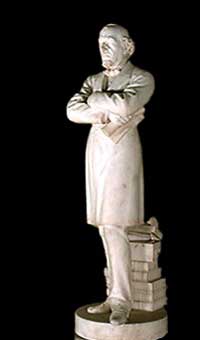Benjamin Disraeli, 1st Earl of Beaconsfield (1804-1881)
Conservative Prime Minister 1868, 1874-1880
© 2007
Armchair Travel Co. Ltd. - This page may be used for non-commercial purposes
ONLY!
![]()

[ Play
Narrated and Animated Movie ! ] Though I sit down now, the time will come when you will hear me.
Benjamin Disraeli was the son of the Jewish writer Isaac D'Israeli. During the early years of his career Disraeli was a law apprentice, journalist, publisher and novelist. His novels were written in a romantic fanciful manner, and he was noted for his frequenting of fashionable London salons with various mistresses, dressed in eccentric clothing. After enduring a serious mental illness he travelled around Europe (Spain, Turkey and the Balkans) as a means of recuperation.
On returning to England in 1832 Disraeli decided to enter politics, but was unsuccessful in securing a seat. Despite five defeats at standing for Parliament, Disraeli soon became known through his writings (e.g. 'Sybil or a Tale of Two Nations' 1845), and his pamphlets and letters to the London Times in which he laid the foundations of his personal Conservative philosophy. He was eventually elected as a member for Maidstone in 1837. However, Disraeli nearly ruined his political career after his debut speech - his unorthodox clothing and long black ringlets led to his being ridiculed and jeered at by the other members of the House - but he confidently stated, 'the time will come when you will hear me'.
In 1841 Disraeli was elected as member for Shrewsbury, and was by now regarded as a very witty and able Tory. His vicious parliamentary attacks on the Tory chief, Peel, eventually led to the fall of Peel's government, and Disraeli became leader of the shattered Conservative Party (which failed to secure power). In February 1852 he became the Chancellor of the Exchequer under the Earl of Derby, and held this position within all of Derby's ministries. It was through this post that Disraeli met Queen Victoria who became fascinated by him. Their rapport lasted throughout his career, and Victoria referred to him as 'Dizzy'. When Derby resigned in February 1868, Victoria unhesitatingly asked Disraeli to become Prime Minister.
This government was short lived and was defeated in the same year by the parliamentary opposition led by William Gladstone. The next six years saw much parliamentary competition and rivalry between these two strong conflicting characters - Gladstone was physically fit and strong, but rather sombre and dull, whereas Disraeli was a weakling but was bright and quick witted.
During one debate when Disraeli was Prime Minister, Gladstone made a powerful speech attacking the Government, striking the despatch box to emphasise each point with increasing ferocity. Disraeli meanwhile, with his feet on the table, his eyes closed and his hat tipped over his eyes, was seen to be sliding further and further down his seat. At last Gladstone reached his crescendo and with a mighty blow on the table scattered all the pens to the ground. There was a hushed silence as Disraeli slowly climbed to his feet and said in a quiet voice, 'The Honourable Gentleman has made his points with great vigour, even with some violence, and I dare say that in this matter some damage has been done' and here he paused and very slowly bent down to retrieve the pens one by one, then straightened and resumed 'but it can all be repaired'.
When Disraeli became Prime Minister again in 1874 he was seventy years of age. This ministry is marked by many notable social developments; the Education Act (1880) made attendance at school compulsory between the ages of four and ten, The Artisans Dwelling Act (1875) provided houses for the poor, the Public Health Act (1875) provided water to housing and refuse collection, the Trade Union Act (1876) allowed picketing and the police enforcement of the abolition of using young children as chimney sweeps. The Imperial policy was heightened by the purchase of shares in the Suez Canal, and the creation of the title of Empress of India for Queen Victoria. In turn, she rewarded him for his services with the title of the Earl of Beaconsfield.
Disraeli was concerned with preventing Russia from advancing further after their defeat of Turkey in the Russo-Turkish War of 1877-1878. His most notable success was his negotiation of the Congress of Berlin in 1878 where he secured 'Peace with Honour' in Europe.
In 1880 Disraeli was defeated in the general election by the Liberals and Disraeli resigned to Gladstone. He retired to the country and wrote his final novel. He died in 1881.
You have accused me of being a flatterer. It is true, I am a flatterer. I have found it useful. Everyone likes flattery; and when you come to royalty, you should lay it one with a trowel.
Yes, I have climbed to the top of the greasy pole.
Someone wrote to me yesterday that no Jew for 1800 years has played so great a part in the world. That would be no Jew since St. Paul; and that is very startling.
I think your being the Leader of the Tory party is the greatest triumph that Liberalism has ever achieved.
He is a self-made man: and worships his creator.
Mr Disraeli, you will probably die by the hangman's noose or of a vile disease.
[ Virtual
Tour ] [ Main Topics
Index ]
- End of Disraeli's maiden speech, December 1837.



Additional Information on
Benjamin Disraeli, 1st Earl of Beaconsfield (1804-1881)
Conservative Prime Minister 1868, 1874-1880
QUOTATIONS
- On himself, c. 1880.
- Himself, on being appointed Prime Minister.
- Lord Acton, Letter, April 1881.
- François Guizot, 1848.
- John Bright, on Disraeli.
- Gladstone
Sir, that depends upon whether I embrace your principles or your mistress.
- Disraeli.
Explore-Parliament.net: Advanced Category Search
Keyword Categories:
_Object_Portrait
_Object_Artwork
_Object_Sculpture
_Peer
_Man
_Person
_Politician
_Consort
_Artist_Gleichen
_Disraeli